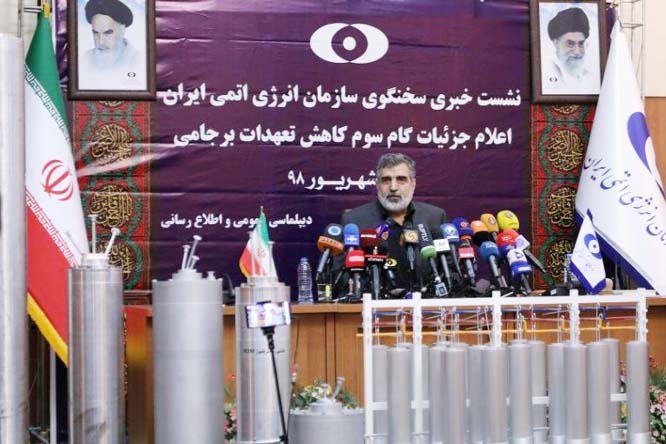
AFP, Tehran :
Iran said Saturday it has fired up advanced centrifuges to boost its enriched uranium stockpiles, in the latest scaling back of commitments under a crumbling 2015 nuclear deal.
The country’s Atomic Energy Organisation said, however, that it would honour commitments to give UN inspectors access to monitor its nuclear sites.
Three European countries-Britain, France and Germany-have been engaged in talks to try to rescue the 2015 deal that gave Iran relief from sanctions in return for curbs on its nuclear programme.
Tensions have been escalating between Iran and the United States since May last year when President Donald Trump pulled out of the accord and began reimposing sanctions that have crippled its economy.
The arch-foes were on the cusp of confrontation in June when Iran downed a US drone and Trump ordered retaliatory strikes before cancelling them at the last minute.
On Saturday, Iran’s Atomic Energy Organisation said it had activated 20 IR-4 and 20 IR-6 centrifuges as its latest step back in rolling back its commitments.
“The centrifuge machines, as they are engaged in research and development, will help with increasing the stockpile,” said the agency’s spokesman, Behrouz Kamalvandi.
“The capacity of these machines is many times more than the previous machines. This started as of yesterday (Friday),” he told a news conference in Tehran.
Under the 2015 Joint Comprehensive Plan of Action (JCPOA), Iran was allowed to enrich uranium using only first generation-or IR-1 — centrifuges.
US Defence Secretary Mark Esper said he was “not surprised that Iran has announced that it’s going to violate the JCPOA”.
“It’s no surprise that the Iranians are going to pursue what the Iranians have always intended to pursue,” he said in Paris.
Kamalvandi said Iran would allow the International Atomic Energy Agency to continue monitoring its nuclear programme, as it has done under the 2015 accord.
Iran said Saturday it has fired up advanced centrifuges to boost its enriched uranium stockpiles, in the latest scaling back of commitments under a crumbling 2015 nuclear deal.
The country’s Atomic Energy Organisation said, however, that it would honour commitments to give UN inspectors access to monitor its nuclear sites.
Three European countries-Britain, France and Germany-have been engaged in talks to try to rescue the 2015 deal that gave Iran relief from sanctions in return for curbs on its nuclear programme.
Tensions have been escalating between Iran and the United States since May last year when President Donald Trump pulled out of the accord and began reimposing sanctions that have crippled its economy.
The arch-foes were on the cusp of confrontation in June when Iran downed a US drone and Trump ordered retaliatory strikes before cancelling them at the last minute.
On Saturday, Iran’s Atomic Energy Organisation said it had activated 20 IR-4 and 20 IR-6 centrifuges as its latest step back in rolling back its commitments.
“The centrifuge machines, as they are engaged in research and development, will help with increasing the stockpile,” said the agency’s spokesman, Behrouz Kamalvandi.
“The capacity of these machines is many times more than the previous machines. This started as of yesterday (Friday),” he told a news conference in Tehran.
Under the 2015 Joint Comprehensive Plan of Action (JCPOA), Iran was allowed to enrich uranium using only first generation-or IR-1 — centrifuges.
US Defence Secretary Mark Esper said he was “not surprised that Iran has announced that it’s going to violate the JCPOA”.
“It’s no surprise that the Iranians are going to pursue what the Iranians have always intended to pursue,” he said in Paris.
Kamalvandi said Iran would allow the International Atomic Energy Agency to continue monitoring its nuclear programme, as it has done under the 2015 accord.

